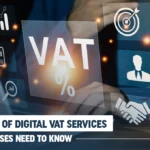How much do you trust your accounting records? Are your financial transactions as secure and transparent as they should be? Businesses today are under increasing pressure to ensure accuracy, prevent fraud, and improve efficiency in financial reporting. Yet, traditional accounting systems continue to struggle with inefficiencies, human errors, and security vulnerabilities.
Here comes blockchain technology, a game-changer that is revolutionizing accounting. With its decentralized and tamper-proof nature, blockchain-based accounting transforms how financial data is recorded and verified. Let’s explore seven major developments reshaping accounting through blockchain, from fraud prevention to real-time auditing.
The End of Financial Fraud? Discover Blockchain’s Immutable Ledger
Fraudulent financial reporting has long plagued businesses, costing the global economy an estimated $5 trillion annually. Traditional accounting systems rely on centralized databases, which can be altered or deleted by unauthorized users. In contrast, Blockchain introduces an immutable ledger, which cannot be changed or erased once a transaction is recorded. By leveraging multi-blockchain accounting, businesses can distribute financial records across multiple networks, further securing data against fraud and manipulation.
Smart Contracts: Is Manual Accounting Becoming Obsolete?
Manual processes like invoicing and payroll are time-consuming and error-prone. Several accounting protocols for blockchain allow for the integration of smart contracts, self-executing agreements that automate financial transactions when conditions are met. For example, imagine a supplier delivering goods to a retailer. Instead of waiting for manual invoice approval, a smart contract automatically verifies delivery, cross-checks it with the purchase order, and releases payment instantly. This automation reduces administrative burdens and has been shown to cut operational costs. Could this mark the beginning of a world where accountants focus more on strategy and insights rather than paperwork?
Real-Time Auditing: Is It the Future of Compliance?
Traditional audits can take weeks, requiring extensive reviews. With blockchain, financial records are updated in real-time, enabling continuous auditing and reducing compliance risks. Using multi-blockchain accounting systems, businesses can comply with financial regulations proactively rather than scrambling to prepare documentation at the last minute. With companies like PwC predicting that blockchain-based auditing can cut verification times by 70%(approx), the accounting profession is poised for a significant shift towards efficiency and transparency.

Reducing Transaction Costs and Cross-Border Fees
International transactions are notoriously expensive due to banking fees and currency exchange costs. Businesses transferring funds across borders often face delays and excessive charges from third-party financial intermediaries. Blockchain eliminates this bottleneck by enabling peer-to-peer transactions, allowing payments to be processed instantly and at a fraction of the cost. By leveraging blockchain technology, companies have reported notable savings in transaction fees, and this financial innovation is not just about speed but about maximizing profitability while ensuring seamless, cost-effective transactions.
Strengthening Cybersecurity in Financial Systems
Cyberattacks targeting financial data are becoming more sophisticated, with centralized accounting systems often serving as prime targets. Blockchain technology offers a robust security solution, utilizing encryption and decentralization to make unauthorized alterations virtually impossible. Unlike traditional databases, where a single security breach can compromise an entire system, blockchain’s distributed nature ensures that data remains secure even if part of the network is attacked. Implementing blockchain protocols for accounting needs strengthens cybersecurity, preventing data breaches and maintaining financial integrity. For businesses handling sensitive financial information, blockchain presents a future where data breaches become a rarity rather than an expectation.
Tokenization: A New Era for Asset Management?
Imagine being able to digitize and trade company assets such as invoices, stocks, or real estate instantly without bureaucratic hurdles. Here comes tokenization, a process enabled by blockchain that allows businesses to convert tangible assets into digital tokens that can be securely stored, traded, and transferred. This innovation is already gaining traction, with the World Economic Forum predicting that 10% of global GDP will be stored on blockchain by 2027. For accountants, this means streamlined asset management, enhanced liquidity, and faster transactions, making financial operations more flexible and efficient than ever before.
AI and Blockchain: The Smart Financial Duo
Artificial intelligence (AI) is revolutionizing financial analysis. AI-driven accounting in blockchain networks enables real-time data monitoring, fraud detection, and predictive analytics. Businesses leveraging AI-driven blockchain analytics have reported a 40% improvement in financial forecasting accuracy. This powerful combination enables organizations to make more informed decisions while reducing the risk of errors and fraud.
Conclusion: Is Your Business Ready for the Blockchain Revolution?
The role of blockchain in accounting is no longer theoretical. It’s happening now, and businesses that embrace this shift are gaining a competitive edge. From fraud prevention and automation to real-time auditing and cost reduction, blockchain is setting new industry standards for security, transparency, and efficiency.
Are you prepared to integrate blockchain into your financial operations? Myriad Finance is at the forefront of this transformation, providing tailored blockchain-driven solutions that enhance security, compliance, and operational efficiency. Contact Myriad Finance today to discover how blockchain can revolutionize your accounting practices and position your business for the future.
Any more questions? Feel free to schedule a consultation now!
Follow us on Linkedin!



